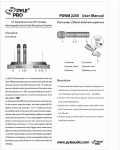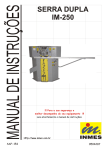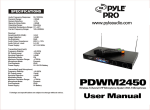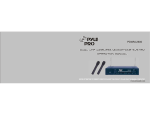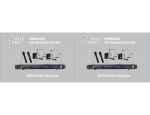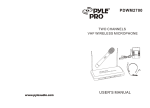Download Pyle PDWM2500 microphone
Transcript
PDWM 2500 DUAL VHF WIRELESS SYSTEM OPERATION MANUAL DUAL VHF WIRELESS SYSTEM OPERATION MANUAL Thank you for buying the PDWM2500 Wireless System. Please read through these operation instructions so you will know how to operate your model properly. After you read it, put it away in a safe place for future reference. Avoid exposure of the system to rain or moisture. No user-serviceable parts inside the system. Refer all servicing to a qualified technician only. Handle the wireless system carefully, dropping or other shocks may cause failure. Avoid using the system where it may be subjected to heat, such as direct sunlight, near radiators or other heat sources. Should any liquid be spilt on the system, stop using it immediately. It may be Precautions Hand-held microphone Receiver unit/operation Installation Trouble shooting Specifications possible to dry the system, but you should have it checked by a qualified technician before using it again. Take care with the main power adapter and lead. If damaged in any way, do not use the system and refer to a qualified technician for repair. Only use the system with the supplied components. Do not attempt to use with any other main power supply adapter . If the wireless system is not going to be used for a while, remove the battery to prevent leakage. In the event of electrolyte leakage inside the battery compartment, carefully remove the leakage with a damp cloth. Take care not to get battery electrolyte in contact with your skin, however if it does, wash your hands under a running tap. If electrolyte comes into contact with your eyes, seek medical advice immediately. Only replace the battery with the same or an equivalent type. Please dispose of old batteries in an environmentally friendly manner in accordance with the relevant legislation. Do not use any solvents to clean any part of the wireless system . 1 1. Unscrew the battery cover at the end of microphone, put a 9V battery into compartment with correct polarities, then close the cover. 2. Move "ON/OFF" switch to "ON" position, "PWR" indic ator comes on b lue. If it does n't come on, please check the voltage of battery or polarities. If the "LOW" indicator comes on, this indicates the battery is dead. Please replace with a fresh battery. 3. The "MUTE" switch cuts off audio output without powering off the microphone. Move the switch down to engage the mute feature, and up to turn it off. 2 1.Pull out the antennas A and B. Make sure they are completely extended and vertical. 2.Insert one end of attached audio cable into "AF OUT" on rear panel, and the other end into "MIC IN" or "AUX IN" of amplifier or mixer. 3.Connect the power adaptor from DC 12V of receiver to a main power socket. 4.Switch on the receiver. The power indicator comes on. 5.Switch on the microphone. The "RF" indicator on receiver comes on green. The "LEVEL" indicator will light up when you speak into the microphone. Adjust the volume by VOL-A and VOL-B control knobs. 3 Using the supplied audio cable, connect from the AF Output jack socket to the "MIC IN" / "LINE IN" socket on amplifier. Connect the mains power adaptor from "DC 12V" jack to a suitable mains power socket. Installation Location: At least 3 ft. above ground level At Least 3 ft. away from wall 4 The on air indicator does not light up No sound The sound is distorted The wireless microphone is not turned on. The microphone receiver is not turned on. Turn on the microphone receiver and the connected audio equipment The microphone receiver is not connected properly. Turn on the microphone receiver and the connected audio equipment The battery in the wireless microphone is weak. Replace the battery. The microphone receiver is not turned on . The connected audio equipment is not turned on. The speakers/headphones. are not connected to the audio equipment. The battery in the wireless microphone is weak. Turn on the microphone receiver and the connected audio equipment. The AUDIO OUT on the receiver is not set correctly. Adjust the volume controls. The distance between the wireless microphone and speakers are too A howling noise close. heard from the speakers. The battery in the wireless microphone is weak 5 Turn on the wireless microphone Turn on the audio equipment. Connect the speakers/ headphones Replace the battery. Move the wireless microphone away from the speakers or change the direction of the microphone. Replace the battery. A.Overall system Oscillation mode: Carrier Frequency Range: Frequency Stability: Modulation Mode: Max Deviation: Dynamic Range: S/N T.H.D: Frequency Response: Operating range: Operating Temperature: Quartz controlled VHF 160~270MHz 30ppm FM 75KHz >100dB >60dB <0.5% 80Hz~20KHz at 3dB Up to 240 Feet -20~50 B. Receiver Sensitivity: Image Rejection: De-emphasis: Audio output level: Audio Output Impedance: Power supply: Power Dissipation: 6dB V at S/N>20dB >50dB 50 s 1V p-p 600ohms DC 12V/ 200mA <800mW C. Transmitter Mike capsule: Pre-emphasis: Antenna: RF output power: Spurious emission: Battery: Power Dissipation: Dynamic microphone 50 s Built-in housing <10mW >40dB one 9V battery <250mW 6







